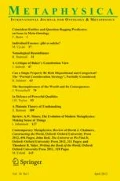Abstract
After a short sketch of Lowe’s account of his four basic categories, I discuss his theory of formal ontological relations and how Lowe wants to account for dispositional predications. I argue that on the ontic level Lowe is a pan-categoricalist, while he is a language dualist and an exemplification dualist with regard to the dispositional/categorical distinction. I argue that Lowe does not present an adequate account of disposition. From an Aristotelian point of view, Lowe conflates dispositional predication with hôs epi to poly statements about what is normally or mostly the case.
Similar content being viewed by others
Notes
Lowe 2006.
The book contains several slightly different diagrams (cf. the list on p. viii); the following diagram is the attempt of a synopsis of these.
Here and throughout the text, I follow the convention to italicize names of universals.
Malzkorn 2000, 461–462 formulates these six conditions as adequacy conditions for a conditional analysis of dispositions, but they can be used for the evaluation of other approaches as well.
Malzkorn 2000, 462.
Cf. Jansen 2007b.
The example is, of course, Aristotle’s, taken from Metaphysics IX 2. Cf. Jansen 2002b, 78–92.
Topics IV 5, 126a 34–35 (kai ho theos kai ho spoudaios ta phaula dran.). On this passage cf. Jansen 2002b, 91 and 268.
For more on Aristotle’s theory of dispositional properties, cf. Jansen 2002b.
The most important references are collected in Jansen 2002a.
References
Angelelli, I. (1967), Studies on Gottlob Frege and Traditional Philosophy, Dordrecht: Reidel.
Armstrong, D. (1997), A World of States of Affairs, Cambridge: Cambridge University Press.
Bird, A. (1998), “Dispositions and Antidotes,” Philosophical Quarterly 48, 227–234.
Campbell, K. (1990), Abstract Particulars, Oxford: Blackwell.
Gunderson, L. (2000), “Bird on Dispositions and Antidotes,” Philosophical Quarterly 48, 227–234.
Jansen, L. (2002a), “hôs epi to poly,” in: Chr. Horn, Chr. Rapp (eds.), Wörterbuch der antiken Philosophie, München: Beck, 199.
Jansen, L. (2002b), Tun und Können. Ein systematischer Kommentar zu Aristoteles’ Theorie dispositionaler Eigenschaften im neunten Buch der Metaphysik, Frankfurt: Hänsel-Hohenhausen.
Jansen, L. (2004), “Dispositionen und ihre Realität,” in: Chr. Halbig, Chr. Suhm (eds.), Was ist wirklich? Neuere Beiträge zu Realismusdebatten in der Philosophie, Frankfurt M.: Ontos, 117–137.
Jansen, L. (2007a), “Aristotle’s Categories,” Topoi 26, 153–158.
Jansen, L. (2007b), “Tendencies and other Realizables in Medical Ontology,” The Monist 90:4, in print.
Lowe, E. J. (1995), Locke on Human Understanding, London: Routledge.
Lowe, E. J. (1998), The Possibility of Metaphysics, Oxford: Clarendon Press.
Lowe, E. J. (2005), Locke, London: Routledge.
Lowe, E. J. (2006), The Four-Category Ontology. A Metaphysical Foundation for Natural Science, Oxford: Clarendon Press.
Malzkorn, W. (2000), “Realism, Functionalism and the Conditional Analysis of Dispositions,” Philosophical Quarterly 50, 452–469.
Martin, C. B. (1994), “Dispositions and Conditionals,” Philosophical Quarterly 44, 1–8.
Mumford, S. (1998), Dispositions, Oxford: Oxford University Press.
Smith, B. (1997), “On Substances, Accidents and Universals: In Defense of a Constituent Ontology,” Philosophical Papers 26, 105–127.
Smith, B. (2003), “Aristoteles 2002,” in: Th. Buchheim, H. Flashar, R.A..H. King (eds.), Kann man heute noch etwas anfangen mit Aristoteles?, Hamburg: Meiner.
Smith, B. (2005), “Against Fantology,” in: M. E. Reicher, J. C. Marek (eds.), Experience and Analysis, öbv & hpt: Wien, 135–170.
von Wachter, D. (2000), Dinge und Eigenschaften. Versuch zur Ontologie, Dettelbach: Röll.
Author information
Authors and Affiliations
Corresponding author
About this article
Cite this article
Jansen, L. Dispositions, Laws, and Categories. Int Ontology Metaphysics 8, 211–220 (2007). https://doi.org/10.1007/s12133-007-0017-4
Published:
Issue Date:
DOI: https://doi.org/10.1007/s12133-007-0017-4



